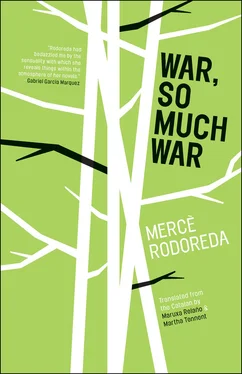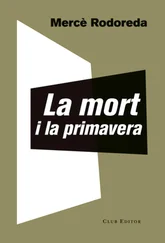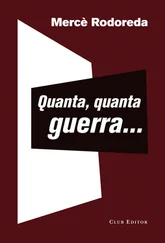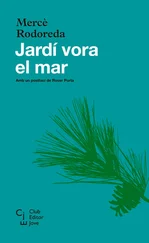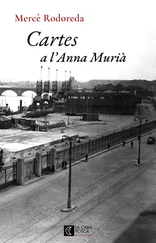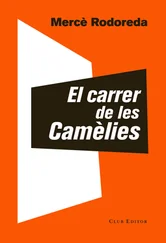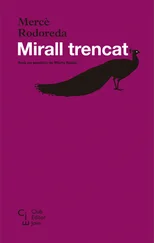A few days after the saintly man’s arrival, he began to gather stones: A wall was going up. He placed one of the stones — the longest and narrowest, which had been half buried near the Pinetell springs — crosswise above the portal, to serve as a lintel. And he covered it all with brick tiles which he had limped over to the abandoned farmhouse to collect. When he had completed work on the chapel, he built an altar from the trunk of an oak tree that had been felled by lightning; he dragged it to the site with a chain I lent him. And on that altar, where he says Mass every day at dawn, he placed a cross like the cross our Savior died on, made from four different kinds of wood: palm, cypress, olive, and cedar. On one side of the cross he keeps a crown of brambles and on the other, three rusted nails held together with a wire, their heads flattened. The Mass he says is unlike most: It seems that an angel — always the same one — serves as his altar boy and blows to enlarge the chapel, sheathing it with a glass veil until it becomes a cathedral. The day he dies, birds will usher him to the heavens — up, up — some pulling, others pushing. . and they will lay him on a shipcloud wreathed in a pearly light. It’ll do you good to see him. They say we are at war, that brothers are killing brothers, but here the God of grass and trees, sky and fog, water and rock continues to bless tender-hearted men. Go to the chapel. Go.

The path winded up among trees with tormented trunks and stiff, shimmering leaves. Through the trees I caught a glimpse of the chapel, entirely of stone, with moss-covered tiles. By the entrance sat a man wearing a garment of sackcloth, with a string around his neck at the end of which hung a cross made of dark wood. A rope, the whole of it a rosary of knots, encircled his waist. He raised his head and greeted me. I heard footsteps. . he stretched out his arm. At his feet lay a basket full of beans. I told him my story. As though he hadn’t heard a word, he issued an order: Help me sort these. The sky above our heads was fretted with small clouds. Along the path I had taken now came a young girl with a large basket. She set it on the ground next to us and took out a loaf of bread and a pot of jam. Without uttering one sad word, she turned and started back down. We cooked the beans on a shivering campfire in the middle of a clearing, in a pot that looked like gold. After lunch I doused the fire with a couple of buckets of water. Then he had me sit beside him and, examining me with his sickly eyes, he began to speak.

My father was a wealthy man. It was my constant misbehavior that put him in his grave. I was always asking him for money, and when he refused to give me any, I forged his signature. I appropriated his name for my own use. I inherited his fortune, but quickly squandered it. Mired in debt, having never worked a day in my life, I saw my friends soon vanish. Scorned by everyone who had surrounded me when my cup overflowed with wealth and plenty, I crumbled. I lodged in a miserable pension until I could no longer afford even that. I could have sought employment only as a stevedore, a porter, a street sweeper, a sign walker. . a house painter? I wouldn’t have known where to start. I stayed indoors during the day to avoid being seen. I wandered the streets at night. In the end, penniless, I took to sleeping fitfully on benches in train stations or in the street, until the first grey streamers of dawn appeared. On one of those nights, a manhole cover slid open, revealing a wreck of a man. With his help I got a job cleaning sewer lines. No one saw me, no one laughed at me. A hatred toward lordly people began to grow inside of me, a hatred toward all those who had money as I once had and whom I now considered my enemy. I loathed sumptuous houses, bejeweled women who were like window displays of rubies and diamonds. The people who had seen me on my knees, at their feet, and with a gesture of a richly ornamented finger and a look that wiped me from the face of the earth, had left me alone with myself.
Like roots whose reach is unknown, the sewer lines coiled beneath the houses of the rich and powerful. My comrades in misery were a resigned lot. . I soon parted ways with them, not because of what they were like, but because I needed to be alone. When I heard someone approaching, I escaped deeper into the sewer. I moved about with a lantern around my neck and carried an iron rod that I banged on the cement vault in my longing to destroy the very foundations of the city. I could feel the remotest sewer lines beckoning me. I spent hour upon hour begrimed, breathing in the foulness of that dark labyrinth that collected the filth of the city. On stormy days the water carried dead rats out to sea. Sometimes my exalted hatred would abate and tears would stream down my cheeks. And then I yearned to breathe the air that I had denied myself. I would search for an exit without finding one. I had no way of knowing beneath which streets, which places I prowled, drenched in putrid water, surrounded by rats that spied on me from hidden crevices. I don’t know how long I lived that way. . until one day I felt the iron rungs of a ladder piercing the soles of my feet. The manhole cover was heavy; my arms were like reeds, my hands like claws. My neck could barely hold my head up. It was a spring night; the air rustled the leaves. I was near the sea and the smell of tar. .
When I came to I was lying on a bunk, all of my senses focused on the sound of lapping water, without the strength to ask myself how I had arrived there. Every now and then I heard the woeful wailing of a siren. I glimpsed a group of officers in a brightly lit room, dressed in white, drinking and laughing. I climbed down a rope ladder and untied the boat.
In the middle of the sea, the sky lulled me, the moon blanched me. Caressed by the sky and the night, alone with my misery, my anger slowly turning into a meaningless word, I discovered what I did not know I had been seeking: to reach God by following the arduous path of life. A beach welcomed me. Kneeling on the sand, I accepted life. I needed to be reborn, to expunge the dictates that men — both the powerful and the powerless — had forced on me. And suddenly, like an immaculate lamb, our Savior, the one who gives all things, revealed Himself to me in the center of the sun.
I traversed village after village, treading upon paths of tender grass, across sowed fields, along riverbanks. I punished myself: I did not eat when hungry, nor drink when thirsty. I drew blood by flogging myself with stinging nettles. . at death’s door, without quite dying, I blessed the tender shoot, the fallen feather, the heart of the flower, the slug and the leech, the green snake and the earth-colored snake, the cascading water, the acorn that satiates the wild boar’s hunger. . and here in this light-infused solitude, gazing at a sun that burns my eyes, in the company of the Cross, upon this friendly earth from which came the clay I was made of, surrounded by life that is robust and secret, I exist in a state of love, so that God might not forsake me.
I CLIMBED AN OLD TREE WHOSE TRUNK, FORTUNATELY, HAD KNOTS that I could use as footholds, for when I found myself near the farmhouse three dogs appeared, barking loudly and charging at me. Below my perch, a table was set for about a hundred people. After a while, the dogs tired of barking and trying to climb the tree and rushed off to greet some girls with baskets who were walking in my direction. They started arranging bread rolls, glasses, wineglasses, and plates around the table. Two little girls who had been hiding behind a well began to scream and plodded over to the tree where I was ensconced. Between two fingers the oldest was holding an earthworm that coiled and uncoiled. She placed it on the ground, and the two of them started poking it with twigs. The slick, red worm kept squirming. They didn’t leave it alone until it had been pulled to pieces. The girls with the baskets were busy coming and going. The little girls again hid behind the well screaming, Another worm! Another worm! Let’s kill it! Let’s kill it! Above my head, a bird watched me, wings spread and head forward.
Читать дальше
